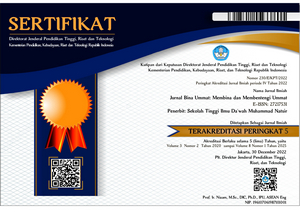THE ROLE OF MOSQUES AS CENTERS FOR EDUCATION AND SOCIAL ENGAGEMENT IN ISLAMIC COMMUNITIES
DOI:
https://doi.org/10.38214/jurnalbinaummatstidnatsir.v6i2.184Keywords:
The Role of Mosques, Educational Centers, Islamic Communities.Abstract
The review identifies innovations and best practices that mosques can adopt in fulfilling their role in a changing Islamic Society. This study uses a literature study with integrative and comprehensive literature analysis in collecting, reviewing, and analyzing various literature sources relevant to the topic of study. The study results revealed that the mosque is not only a place of worship but an integral center of empowerment in strengthening the Islamic community's educational, social, and spiritual dimensions. The educational function within mosques provides a strong foundation in religious understanding, ethics, and practical skills. In contrast, the role of mosques in social services creates social solidarity and a deep sense of social responsibility. Mosques also play an essential role in developing individuals' religious identities, strengthening ties with the larger Muslim community, and motivating them to create positive change in society actively.
Published
Issue
Section
This work is licensed under a Lisensi Creative Commons Atribusi 4.0 Internasional.
Authors who publish with this journal agree to the following terms:
- Authors retain copyright and grant the journal right of first publication with the work simultaneously licensed under a Creative Commons Attribution License that allows others to share the work with an acknowledgment of the work's authorship and initial publication in this journal.
- Authors are able to enter into separate, additional contractual arrangements for the non-exclusive distribution of the journal's published version of the work (e.g., post it to an institutional repository or publish it in a book), with an acknowledgment of its initial publication in this journal.
- Authors are permitted and encouraged to post their work online (e.g., in institutional repositories or on their website) prior to and during the submission process, as it can lead to productive exchanges, as well as earlier and greater citation of published work (See The Effect of Open Access).




